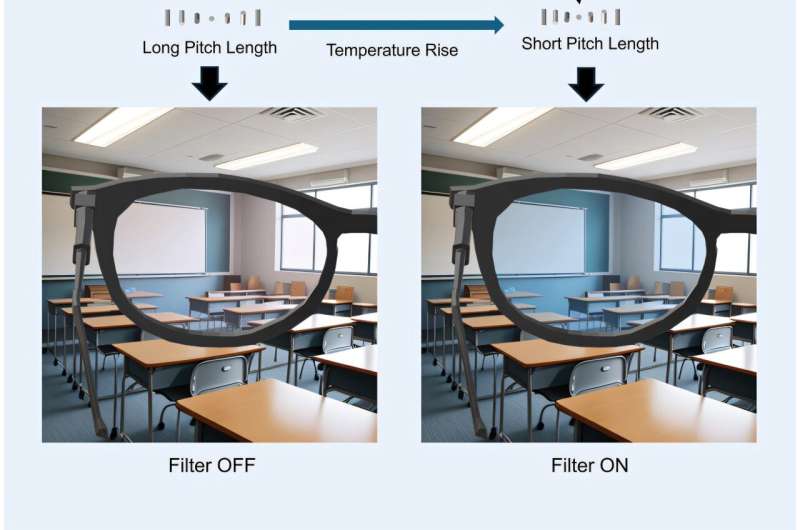
November 22, 2024 by University of Glasgow
Collected at: https://phys.org/news/2024-11-prototype-lenses-block-epileptic-seizure.html
People with photosensitive epilepsy could benefit from a prototype pair of glasses with lenses that block out wavelengths that are known to cause seizures in some people.
In a study published in Cell Reports Physical Science, researchers from the University of Glasgow and University of Birmingham have developed a prototype of a liquid crystal lens that they believe could help photosensitive epilepsy sufferers.
The lenses are controlled by very small changes in temperature that can be built into the lens, and when activated can block more than 98% of light in the 660–720nm wavelength range, known to affect the greatest number of people suffering from photosensitive epilepsy.
Zubair Ahmed, Professor of Neuroscience at the University of Birmingham and co-author of the study said, “This is a hugely exciting project that felt like a science fiction project when we first started the work four years ago. This paper demonstrates the potential for the use of liquid crystal lenses that can be modulated to cut out specific wavelengths of light.”
“The prototype shows how a discrete circuit installed in the frame of a pair of glasses can power these lenses and be used in situations where a certain wavelength of light is likely to trigger a seizure, such as while watching TV or playing computer games. The circuit heats up the lenses to a comfortable temperature for wearers that will also cut out more than 98% of light with a wavelength that can cause seizures.”

Rami Ghannam, Professor of Electronics at the University of Glasgow and lead author of the study said, “The project shows how collaboration between different disciplines such as engineering, neuroscience and mathematics can bring about potential discoveries that could transform the lives of patients affected by various diseases.”
“We are now developing this protype further to improve its performance before we take this into human studies.”
The authors note that the current prototype was functional in rooms up to 26°C temperatures, and further tweaks to the technology would be needed to cater for uses in hotter environments. The team also note that the time taken for the prototype to heat and cool could be improved.
More information: Yuanjie Xia et al, Thermal-controlled cholesteric liquid crystal wavelength filter lens for photosensitive epilepsy treatment, Cell Reports Physical Science (2024). DOI: 10.1016/j.xcrp.2024.102158
Journal information: Cell Reports Physical Science

Leave a Reply